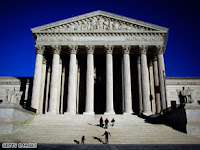The president is aware of a "fairly tight timeline" to nominate a candidate in time for the Senate to hold hearings and vote, White House Press Secretary Robert Gibbs told reporters Monday. The next session will begin in
early October.
Obama got his first opportunity to have an impact on the nation's highest court when Justice David Souter anno unced Friday he will leave the bench after
unced Friday he will leave the bench after
19 years.
Several factors are being considered in a Supreme Court candidate, White House officials say, including diversity, experience, and age.
The president wants to have a nominee in place and "get something done before Congress gets out of town in August," Gibbs said. That would mean the Senate would vote on the nominee shortly after the August recess ends around Labor Day, if not before, he said. He later clarified his remarks, saying that by late July "this process has to be a decent ways down the field."
But the White House was offering no predictions on when a candidate will be named.
"The process has begun — and began some time ago — to go through prospective and potential candidates, to begin to review the history and the background and their experience," Gibbs said. "But I don't have a specific timeline." No candidates have yet been interviewed by Obama, he said.
Obama called Sens. Orrin Hatch and Arlen Specter of the Judiciary Committee, which will review the nominee's record and hold confirmation hearings. Hatch, a Republican, warned the White House on Sunday about selecting a "judicial activist" to the high court. Specter, a moderate, last week switched to the Democratic Party.
Several factors are being considered in a Supreme Court candidate, White House officials say, including diversity, experience, and age.
"You always assume, rightly so, that whomever you choose is going to have a significant impact on the court for quite some time," said Gibbs. "This is one of nine. And I think you have to assume that whomever you pick is somebody that you believe will have great weight on the court for a long time to come."
Chief Justice John Roberts and Justice Samuel Alito — President George W. Bush's 2005 picks — are both still in their 50s. Justice Clarence Thomas, named by President George H.W. Bush in 1991, turns 61 in June. The other justices besides Souter are all in their 70s or 80s.
But Gibbs emphasized again the main qualities Obama will be looking for: "Somebody that understands the rule of law, somebody that has a record of excellence and integrity, somebody who also understands how these opinions affect everyday lives, and will exercise some common sense."






No comments:
Post a Comment